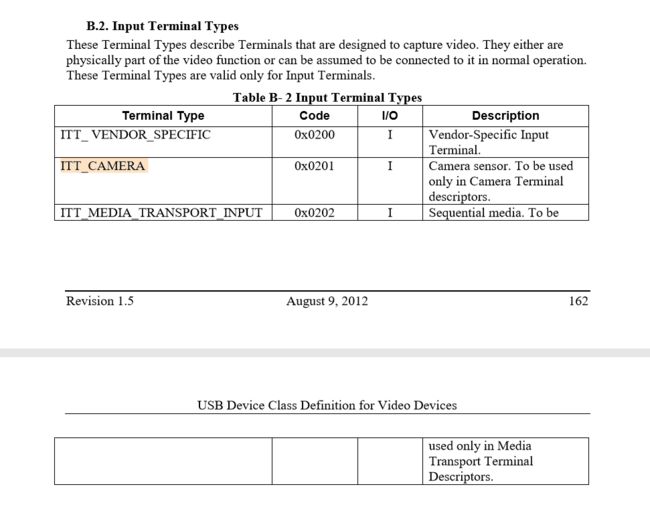Android项目复盘4
个人主页:https://chengang.plus/
文章将会同步到个人微信公众号:Android部落格
UVC协议文档网址:https://www.usb.org/documents?search=&type%5B0%5D=55&items_per_page=50
主要下载USB Video Class 1_5,关注下载zip包中的UVC 1.5 Class specification.pdf文件,里面有接口相关的解释。
Android盒子控制摄像头项目已经差不多4年了,很多知识点已经忘记,现在重新温固一遍,下面两篇文章可以帮助回顾。
https://my.oschina.net/u/2007478/blog/968470
https://blog.csdn.net/go_str/article/details/80844175
下边两个网址中可以找到代码中各种结构体的解释:
https://www.kernel.org/doc/html/v4.13/media/v4l-drivers/uvcvideo.html
https://www.linuxtv.org/downloads/legacy/video4linux/API/V4L2_API/spec-single/v4l2.html
1、Linux kernel下的UVC
我们先从Android官网git clone一下kernel的源码:
https://android.googlesource.com/kernel/goldfish/
git clone https://android.googlesource.com/kernel/goldfish
clone到本地之后就可以通过Source Insight查看源码了。查看源码之前先project -> rebuild project,这样代码中各对象之间可以点击跳转。
1.1 初始化
goldfish\drivers\media\usb\uvc\uvc_driver.c
static int __init uvc_init(void)
{
int ret;
ret = usb_register(&uvc_driver.driver);
return 0;
}
struct uvc_driver uvc_driver = {
.driver = {
.name = "uvcvideo",
.probe = uvc_probe,
.disconnect = uvc_disconnect,
.suspend = uvc_suspend,
.resume = uvc_resume,
.reset_resume = uvc_reset_resume,
.id_table = uvc_ids,
.supports_autosuspend = 1,
},
};
在入口函数uvc_init中,核心的一行是usb_register,也就是注册USB设备,在注册完成之后会调用uvc_probe函数。
goldfish\include\linux\usb.h
struct usb_driver {
const char *name;
int (*probe) (struct usb_interface *intf,
const struct usb_device_id *id);
看看这个uvc_probe函数:
goldfish\drivers\media\usb\uvc\uvc_driver.c
static int uvc_probe(struct usb_interface *intf,
const struct usb_device_id *id)
{
struct usb_device *udev = interface_to_usbdev(intf);
struct uvc_device *dev;
int ret;
if (id->idVendor && id->idProduct)
uvc_trace(UVC_TRACE_PROBE, "Probing known UVC device %s "
"(%04x:%04x)\n", udev->devpath, id->idVendor,
id->idProduct);
else
uvc_trace(UVC_TRACE_PROBE, "Probing generic UVC device %s\n",
udev->devpath);
uvc_parse_control(dev);//1
v4l2_device_register(&intf->dev, &dev->vdev);//2
uvc_ctrl_init_device(dev);//3
uvc_scan_device(dev);
uvc_register_chains(dev);
usb_set_intfdata(intf, dev);
ret = uvc_status_init(dev);
usb_enable_autosuspend(udev);
}
- 每一个摄像头设备在底层初始化完成之后,都会有一个vendorId和productId。
uvc_parse_control会根据设备的vendorId和productId去对特定厂商的摄像头做一些适配。v4l2_device_register,该方法将设备注册到v4l2,v4l2是Video for linux2的简称,为linux中关于视频设备的内核驱动。该方法在goldfish\drivers\media\v4l2-core\v4l2-device.c中。uvc_ctrl_init_device,初始化设备控制。
1.2 初始化设备控制
这里是我们需要重点关注的。可以先跟踪一下这个调用栈。
goldfish\drivers\media\usb\uvc\uvc_ctrl.c
int uvc_ctrl_init_device(struct uvc_device *dev)
{
list_for_each_entry(entity, &dev->entities, list) {
struct uvc_control *ctrl;
unsigned int bControlSize = 0, ncontrols;
__u8 *bmControls = NULL;
//第一部分
if (UVC_ENTITY_TYPE(entity) == UVC_VC_EXTENSION_UNIT) {
bmControls = entity->extension.bmControls;
bControlSize = entity->extension.bControlSize;
} else if (UVC_ENTITY_TYPE(entity) == UVC_VC_PROCESSING_UNIT) {
bmControls = entity->processing.bmControls;
bControlSize = entity->processing.bControlSize;
} else if (UVC_ENTITY_TYPE(entity) == UVC_ITT_CAMERA) {
bmControls = entity->camera.bmControls;
bControlSize = entity->camera.bControlSize;
}
//第二部分
/* Initialize all supported controls */
ctrl = entity->controls;
for (i = 0; i < bControlSize * 8; ++i) {
if (uvc_test_bit(bmControls, i) == 0)
continue;
ctrl->entity = entity;
ctrl->index = i;
uvc_ctrl_init_ctrl(dev, ctrl);
ctrl++;
}
}
}
1.2.1 ENTITY类型过滤
用于区分终端类型,重点关注UVC_ITT_CAMERA类型,看看这个类型在UVC协议文档里面的定义:
摄像头传感器,仅用于描述摄像头终端。那么代码里面的描述是:
goldfish\include\uapi\linux\usb\video.h
/* B.2. Input Terminal Types */
#define UVC_ITT_VENDOR_SPECIFIC 0x0200
#define UVC_ITT_CAMERA 0x0201
#define UVC_ITT_MEDIA_TRANSPORT_INPUT 0x0202
1.2.2 初始化uvc_control
从第一部分中取出camera.bmControls和camera.bControlSize,这两个变量是干嘛的呢,还是看协议文档:
[外链图片转存失败,源站可能有防盗链机制,建议将图片保存下来直接上传(img-fiCTUia0-1593603543308)(https://ftp.bmp.ovh/imgs/2020/06/8968c359b0b5fc9b.png)]
[外链图片转存失败,源站可能有防盗链机制,建议将图片保存下来直接上传(img-zcNwSHhb-1593603543310)(https://ftp.bmp.ovh/imgs/2020/06/fdf441b15a72d2f9.png)]
bControlSize是对应着bmControls的位大小;
bmControls对应着摄像头支持的控制参数,如果控制参数位置为1,表示支持该控制。
1.2.2.1 方法uvc_ctrl_init_ctrl
接下来调用uvc_ctrl_init_ctrl方法:
goldfish\drivers\media\usb\uvc\uvc_ctrl.c
static void uvc_ctrl_init_ctrl(struct uvc_device *dev, struct uvc_control *ctrl)
{
const struct uvc_control_info *info = uvc_ctrls;
const struct uvc_control_info *iend = info + ARRAY_SIZE(uvc_ctrls);
const struct uvc_control_mapping *mapping = uvc_ctrl_mappings;
const struct uvc_control_mapping *mend = mapping + ARRAY_SIZE(uvc_ctrl_mappings);
for (; info < iend; ++info) {
if (uvc_entity_match_guid(ctrl->entity, info->entity) &&
ctrl->index == info->index) {
uvc_ctrl_add_info(dev, ctrl, info);
break;
}
}
if (!ctrl->initialized)
return;
for (; mapping < mend; ++mapping) {
if (uvc_entity_match_guid(ctrl->entity, mapping->entity) &&
ctrl->info.selector == mapping->selector)
__uvc_ctrl_add_mapping(dev, ctrl, mapping);
}
}
1.2.2.2 结构体uvc_control_info
- uvc_ctrls,这个结构体的类型是
uvc_control_info,是一个静态数组。可以理解为一个实体类别下对应着多个控制功能,每个功能有对应着不同的操作方式,以当前项目需要用到的功能举例:
static struct uvc_control_info uvc_ctrls[] = {
{
.entity = UVC_GUID_UVC_CAMERA,
.selector = UVC_CT_PANTILT_ABSOLUTE_CONTROL,
.index = 11,
.size = 8,
.flags = UVC_CTRL_FLAG_SET_CUR
| UVC_CTRL_FLAG_GET_RANGE
| UVC_CTRL_FLAG_RESTORE
| UVC_CTRL_FLAG_AUTO_UPDATE,
},
{
.entity = UVC_GUID_UVC_CAMERA,
.selector = UVC_CT_PANTILT_RELATIVE_CONTROL,
.index = 12,
.size = 4,
.flags = UVC_CTRL_FLAG_SET_CUR | UVC_CTRL_FLAG_GET_MIN
| UVC_CTRL_FLAG_GET_MAX | UVC_CTRL_FLAG_GET_RES
| UVC_CTRL_FLAG_GET_DEF
| UVC_CTRL_FLAG_AUTO_UPDATE,
},
}
-
entity 实体是一种类型,
UVC_GUID_UVC_CAMERA只是其中一种,还有UVC_GUID_UVC_PROCESSING等。 -
selector 对应的是实体下的一种功能,比如相对绝对转动。
-
index 对应着在
uvc_ctrls中的序号。
/* Bit index in bmControls */
- size 对应着具体操作位的长度,比如上边列举出来的
UVC_CT_PANTILT_ABSOLUTE_CONTROL和UVC_CT_PANTILT_RELATIVE_CONTROL控制,看看在协议文档中的定义:
[外链图片转存失败,源站可能有防盗链机制,建议将图片保存下来直接上传(img-q0hHvuSC-1593603543313)(https://ftp.bmp.ovh/imgs/2020/06/7b49813393d6df2a.png)]
对于PanTilt Absolute来说,高四位代表着左右的角度,低四位代表着上下的角度,都是有符号整数,总共八位,所以size为8。
对于PanTilt Relative来说,总共四位,每一位代表不同的控制属性,第一位表示左右相对;第二位表示左右控制的速度;第三位表示上下相对;第四位表示上下的速度。所以size为4。
- flags 表示对于这些
selector支持的功能操作:
详细的解释如下:
[外链图片转存失败,源站可能有防盗链机制,建议将图片保存下来直接上传(img-avwX0hkZ-1593603543317)(https://ftp.bmp.ovh/imgs/2020/06/bf6ed7fc695057a8.png)]
1.2.2.3 结构体uvc_control_mapping
uvc_ctrl_mappings是uvc_control_mapping类型的结构体变量,也是一个静态的结构体,简略看下里面定义了啥:
static struct uvc_control_mapping uvc_ctrl_mappings[] = {
{
.id = V4L2_CID_PAN_ABSOLUTE,
.name = "Pan (Absolute)",
.entity = UVC_GUID_UVC_CAMERA,
.selector = UVC_CT_PANTILT_ABSOLUTE_CONTROL,
.size = 32,
.offset = 0,
.v4l2_type = V4L2_CTRL_TYPE_INTEGER,
.data_type = UVC_CTRL_DATA_TYPE_UNSIGNED,
},
{
.id = V4L2_CID_TILT_ABSOLUTE,
.name = "Tilt (Absolute)",
.entity = UVC_GUID_UVC_CAMERA,
.selector = UVC_CT_PANTILT_ABSOLUTE_CONTROL,
.size = 32,
.offset = 32,
.v4l2_type = V4L2_CTRL_TYPE_INTEGER,
.data_type = UVC_CTRL_DATA_TYPE_UNSIGNED,
},
}
可以看到这里的id开头都是V4L2,而entity和selector都对应着uvc_control_info uvc_ctrls中定义的entity和selector。
另外v4l2_type对应着设置的数据类型,data_type则定义了数据为有符号还是无符号。
这个结构体从我的理解来看,就是将UVC定义的控制,映射到v4l2,并建立两者之间的关系。
1.2.2.4 方法uvc_ctrl_add_info
这个方法核心就一行代码:
goldfish\drivers\media\usb\uvc\uvc_ctrl.c
static int uvc_ctrl_add_info(struct uvc_device *dev, struct uvc_control *ctrl,
const struct uvc_control_info *info)
{
ctrl->info = *info;
}
将上一步uvc_control_info变量给到uvc_control的info。uvc_control的定义如下:
goldfish\drivers\media\usb\uvc\uvcvideo.h
struct uvc_control {
struct uvc_entity *entity;
struct uvc_control_info info;
__u8 index; /* Used to match the uvc_control entry with a
uvc_control_info. */
__u8 dirty:1,
loaded:1,
modified:1,
cached:1,
initialized:1;
__u8 *uvc_data;
};
1.2.2.5 方法__uvc_ctrl_add_mapping
同样的,将uvc_control_mapping数据赋值到uvc_control对象中:
goldfish\drivers\media\usb\uvc\uvc_ctrl.c
static int __uvc_ctrl_add_mapping(struct uvc_device *dev,
struct uvc_control *ctrl, const struct uvc_control_mapping *mapping)
{
struct uvc_control_mapping *map;
map = kmemdup(mapping, sizeof(*mapping), GFP_KERNEL);
map->menu_info = kmemdup(mapping->menu_info, size, GFP_KERNEL);
list_add_tail(&map->list, &ctrl->info.mappings);
}
uvc_control_info的mappings作为链表头,将map->list添加到后面。
1.3 总结
在初始化的过程中可以将UVC协议的文档跟代码建立联系,以帮助理解代码的逻辑。待理解了各种数据类型定义的原理及流程之后,发现其实现了UVC与V4L2的连接,这样下一步的工作就比较好开展了。
UVC初始化的部分到这里告一段落,接下来要根据具体需求做一些定制的工作。
![]()

